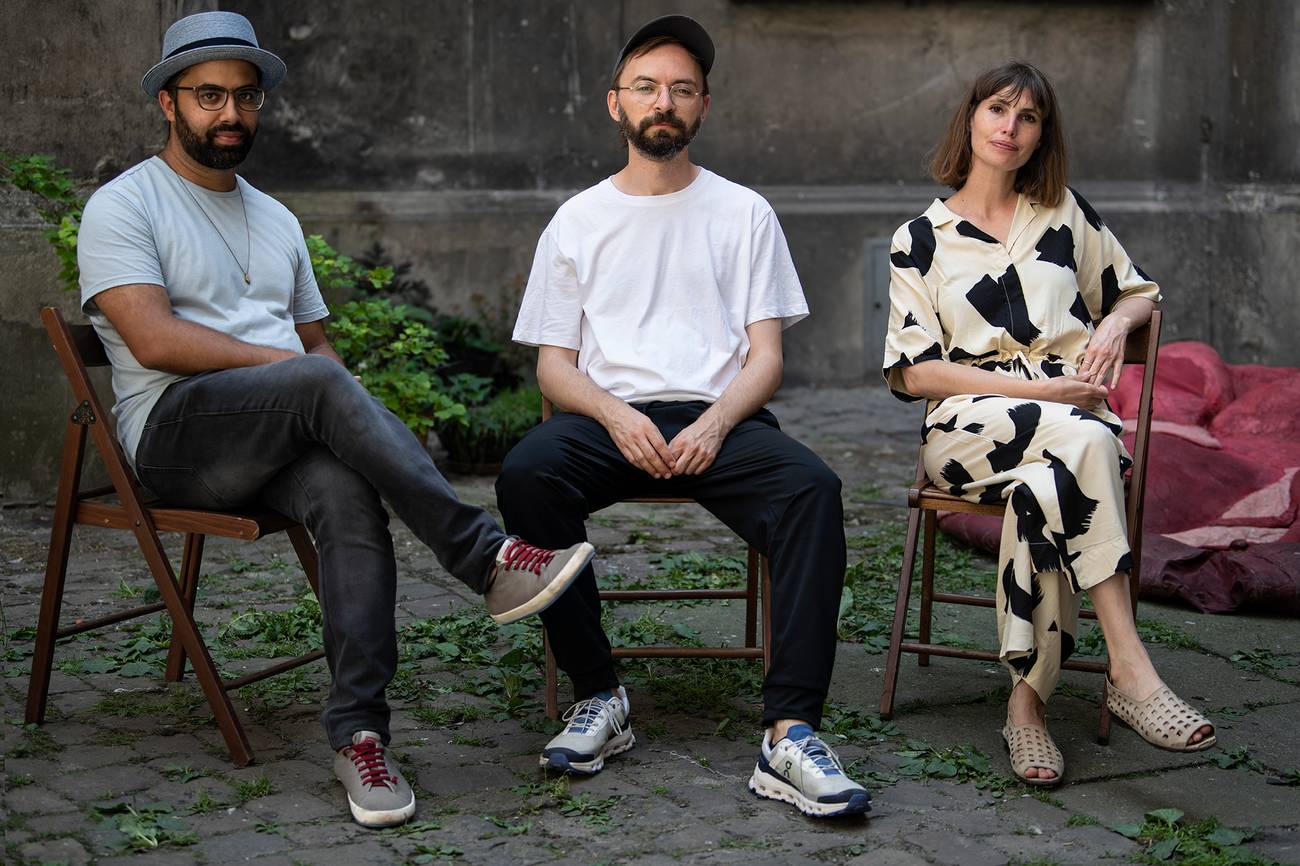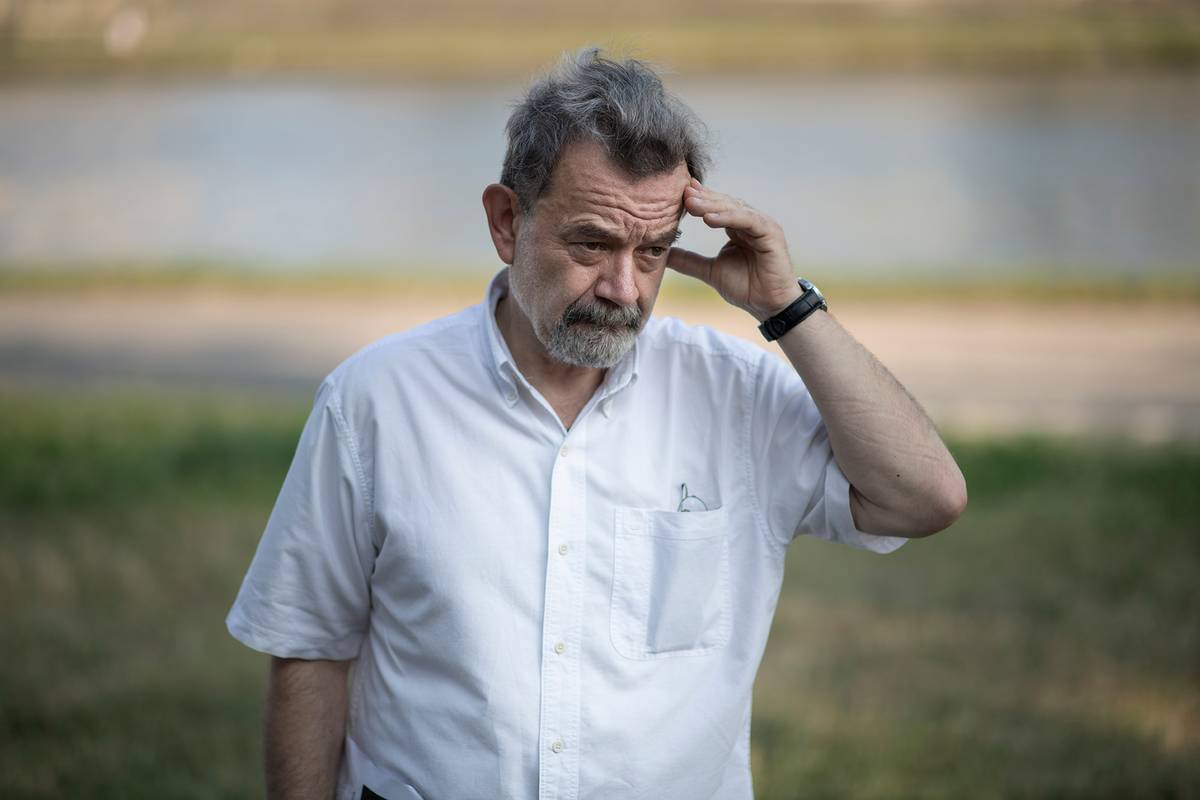Looking for the Heart of Jewish Krakow
The annual cultural festival gets bigger and bigger. But has the city become a Jewish theme park, or is it proof that Jewish life in Poland continues to endure and even thrive?



The 31st Jewish Culture Festival kicked off on a toasty evening on June 24 in Krakow’s historic Jewish neighborhood of Kazimierz. The tourist crowds were out in full force, though it was hard to gather who was in town for the festival, and who was simply visiting Krakow’s miraculously unbombed UNESCO World Heritage city center.
I came exclusively for the festival, an event I first learned of back in Germany a few years ago. I’d also been interested in a return visit to Krakow, specifically Kazimierz, since leaving the neighborhood at the end of a self-made heritage trip in March 2019.
Critiques I’ve since read of the neighborhood’s alleged Disneyfication left me curious to further explore just how Jewish Kazimierz really is these days. Is the klezmer music blaring out across Szeroka Square kitsch or simply echoes of the historic heart and soul of Kazimierz?
Klementyna Poźniak, communications specialist at the Jewish Community Center of Krakow, met me at the Miodowa tram stop at the edge of Kazimierz. The JCC of Krakow is a local partner of the festival, organizing (among other events) the annual 60-mile Ride of the Living cycling event from the Auschwitz-Birkenau death camps to the JCC Krakow headquarters in Kazimierz.
The 25-year-old Poźniak shared her journey of leaving Poland as a child for the United States, going to school outside Cleveland, and following the pull back to Krakow as a young adult: “Poland has always been my home, and for years I felt as if I was living in exile, waiting to return,” said Poźniak. “Now that I am back and can be a part of such incredible work, I know I made the right choice.”
We didn’t get far in our jaunt before noticing some graffiti scribbled across a large, wraparound poster promoting the festival. With the word “Palestyna” and an incorrectly drawn Star of David, it was easy to get the message without speaking Polish.
“Unfortunately this does happen,” said Poźniak.
“What does it say?” I asked.
“‘Free Palestine’ and ‘Zionism is fascism.’”
I noticed similar markings on Jewish Culture Festival posters across town. Elsewhere in the neighborhood, I spotted another incorrectly drawn Star of David next to an equal sign and a lopsided swastika.
Fortunately, the antisemitism seemed to be limited to these sloppy scribblings. Everyone from the festival founder Janusz Makuch to longtime attendees, like Jewish heritage author and scholar Ruth Ellen Gruber, said that there’s never been an incident at the festival. Some security measures have tightened, namely at concerts, but no more so than what seems to be standard practice at Jewish gatherings in Europe.
What was more apparent was the city’s Jewish life. Only a few minutes into our conversation, Poźniak spotted Rabbi Avi Baumol on a Shabbos stroll, giving a tour of the neighborhood to some visitors to Krakow. Baumol was sporting a suit and tie with the demeanor of a blues band frontman: suave, shooting off sarcastic barbs left and right.
The rabbi was participating in the festival as a lecturer. I asked what he thought of it, having been in Krakow for nine years. “I’m for it,” he said succinctly with a wry smile before shifting to a more earnest gear. “I think it’s incredible to see non-Jews take such an interest to put this on, the largest Jewish festival in the world.”
Indeed, what some call the Jewish Woodstock continues to grow and pull travelers, Jewish and non-Jewish alike, from across the world. Estimates have the festival drawing upward of 30,000 annually in a nonpandemic year to its varied program of art exhibitions, religious services, parties, guided tours, lectures, films, workshops, and concerts.
Poźniak took me by a market stand and pointed out a man selling menorahs and other lost family heirlooms. This is an aspect of Kazimierz that Poźniak said she can do without. The assumption is, given the context of Polish history, that this man ended up with the items from less than ethical means. After all, it’s not like this is a merchandise stand at Coachella.
This is where, for some, the critique of Kazimierz comes into play. It’s a neighborhood that’s been maligned by some Jewish travelers as a Disneyfication of Jewish life. There’s the seemingly omnipresent echo of a lost klezmer clarinet, constant streams of tour groups bouncing over cobblestones on trackless tourist trains, and restaurants in the heart of Kazimierz are dressed up like the dining room of a mid-20th century bubbe with the menu to match.
Yes, that’s there. But to flippantly dismiss contemporary Krakovian Jewish life would be both an insult and play into false narratives that Jewish culture is a relic of history, destroyed by the Nazis. The fact that Jewish life is growing in Krakow is immeasurably more important to young Krakovian Jews like Poźniak. They’re the ones joining the local JCC and getting involved with community events, like the Jewish Culture Festival and the Ride of the Living. Events like the festival, she says, show people that Jewish culture is alive.
Ruth Ellen Gruber is a journalist, author, editor, and researcher whose work focuses on Jewish heritage and contemporary Jewish issues in Europe. She’s also a longtime festival visitor and remembers those early years when Kazimierz was a “ghost town.” This year, she sat on a two-person panel at the New Realities of Jewish Heritage conference that took place during the festival.
I asked her about the Disneyland criticism.“I reject that,” Gruber said, her hand wrapped around a Bagelmama bagel smothered in cream cheese. “Disneyland, to me, is something that comes from the top down. The growth of Jewish-themed tourism that is sometimes criticized as ‘Disneylandification’ was an organic development.”
But prior to the commercialization of the neighborhood, the festival became a draw for a slew of Jewish performers, more of whom came year after year. “It became the best party you can ever imagine,” Gruber said. It also started to influence how Jews saw Poland. It was no longer this crumbled up bit of black-and-white celluloid frozen in time, but a place full of color and flowers.
Yael Sherill, 39, is a Berlin-based Israeli artist and curator for Maiseh, a series of site-specific art projects that ran throughout the festival. Discussing representations of Poland in the Jewish world, she shared her frustration with the way Israeli education engages with the topic. She referred to school trips to the Auschwitz-Birkenau death camp where students deal solely with the darkness of this history, ignoring the complexity of Jewish life that once thrived and is actively rebuilding in Krakow, highlighted in events like the Jewish Culture Festival. “If you really look at the format of the festival, the depth, and the complexity of things that are being dealt with, it’s really a contrarian approach to the touristification, to the Disneylandification that is happening in the neighborhood,” she said.

Sherill joined me at the Cheder Café, doubling as festival headquarters, with her fellow Maiseh curators: the locally based Paweł Kowalewski, 36, and Jerusalem-based Meydad Eliyahu, 39. It’s the second year in a row that the three have worked together.
Sitting around a small wooden table, Sherill explained that the escalation of the war in Ukraine and the presence of Ukrainian refugees in Krakow played a role in their decision to name their program Maiseh––a Yiddish word usually used in reference to a legend. “We were looking for a way to react to that situation [in Ukraine] and bring people together around storytelling,” said Sherill. “We wanted to look at the local tales of Krakow and how those tales are now merging with all of the different communities that find themselves living here.”
It’s a sentiment Poźniak touched on as well. Since the Russian invasion began in February, an estimated 50,000 Ukrainian refugees have fled to Krakow. In response, Poźniak and her colleagues have welcomed Jewish and non-Jewish refugees to the Jewish Community Center. A yellow banner stretches across the metal gate entrance to the JCC with blue Cyrillic letters welcoming Ukrainians next to the Ukrainian flag.
“We became relief workers overnight and had to learn everything on the job,” said Poźniak, who spent time volunteering on the Polish-Ukrainian border. “We’ve managed to balance both our responsibilities to the Jewish community and the Ukrainian refugees.”
Back at the Cheder Café, the conversation turned to Jewish representation at the festival. None of the Maiseh curators particularly cared who was Jewish and who was not.
For Sherill, there’s a big difference between a Jewish festival and a Jewish culture festival. “Jewish culture is not owned by Jewish people,” she said. “Jewish culture is a culture that was here, that can be experienced from different perspectives, and it was a huge part of local society.”
She resents any attempt made by others to label or decide who is allowed to deal with Jewish themes and doesn’t believe having more Jewish people involved will give the festival more legitimacy than having someone like the festival’s non-Jewish founder, Janusz Makuch. “He probably knows 2,000% more about Jewish culture than I do,” she said. “And I grew up in Israel, in a Jewish family.”
I was noshing on a rose baklava when Makuch walked into the Cheder Café. He’s a theatrical man. Dressed in a black T-shirt with “The Macher” (Yiddish for an influential person, someone who gets things done) in small text, he leaned forward, he leaned back, his voice went high, his voice went low, he tucked his bearded chin in and bellows a few bass lines of an old Yiddish tune. He stood up, he embodied someone else, he imitated, he waved his hands like a weather forecaster tracking a storm, and he cursed with full-throated emphasis on his profanity of choice––all in the span of a few minutes. The voice of Orson Welles came to mind, with a dash of Werner Herzog.
A simple question didn’t get a simple answer. To talk about the water theme of this year’s festival, he was compelled to go back to the beginning––to his shtetl, as he calls it, of Puławy in eastern Poland, where he first learned about Jewish culture and of his town’s Jewish history.
Makuch peppered his English with more Yiddish and Hebrew than I’ve ever heard before. He self-deprecatingly dismissed himself on a couple of occasions as an “alte kacker,” Yiddish for “old-timer,” or the “meshuggah Shabbos goy.” Although in another breath he said he’s more Jewish than Pole. It could be difficult to keep up. In many ways he’s a reflection of the complex, evolving nature of Polish history.
But at the end of a nearly hourlong monologue, his passion for the festival and celebrating Jewish culture was unmistakable. “I want to emphasize that the festival is a living Jewish cultural festival,” he said. “We are the keepers of this living space where Jewish people from all over the world can find themselves. It’s a space which is painful and full of hope at the same time.”
The hope for some is a new relationship between Jews and places like Krakow.
“I don’t want younger generations to just learn about how Jews were killed,” said Gruber. “I want them to learn about how they lived and continue to do so.”
Joe Baur is a Berlin-based writer, author, and filmmaker from Cleveland.